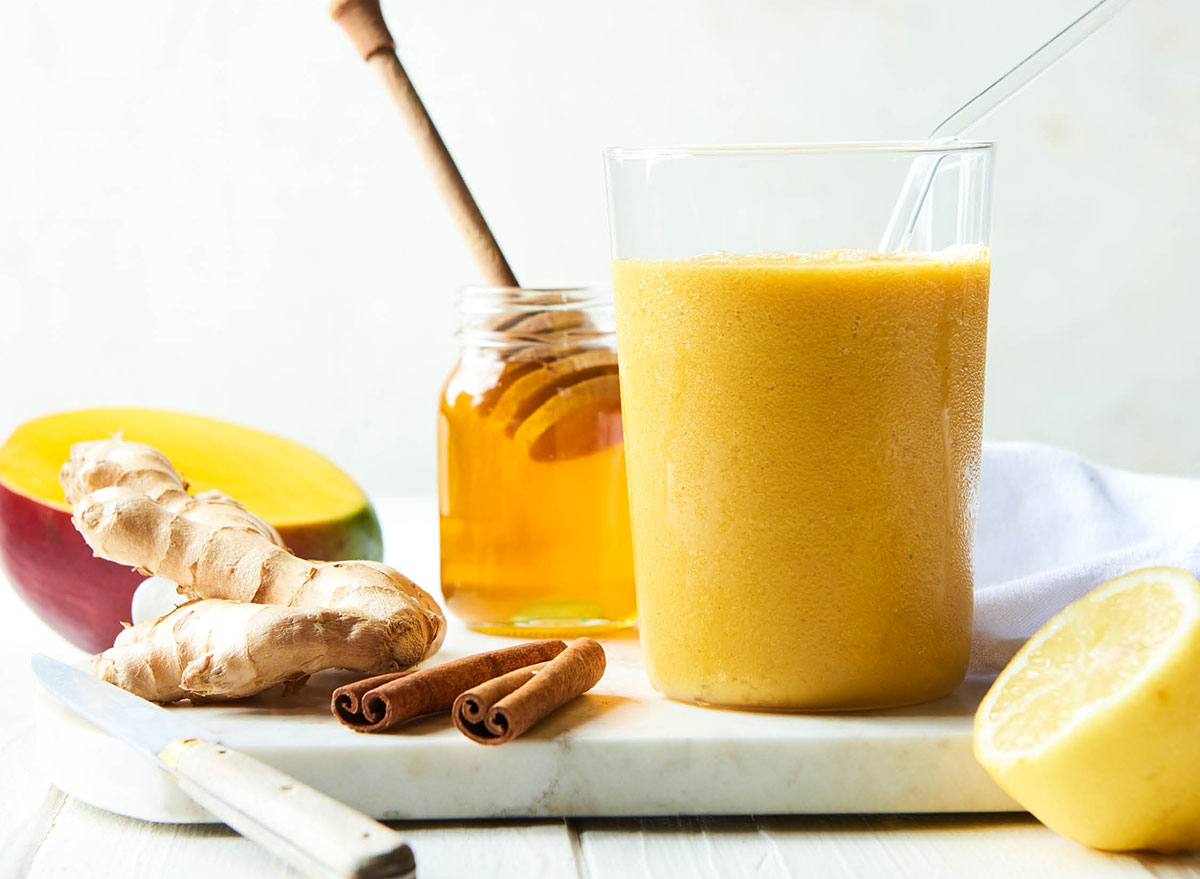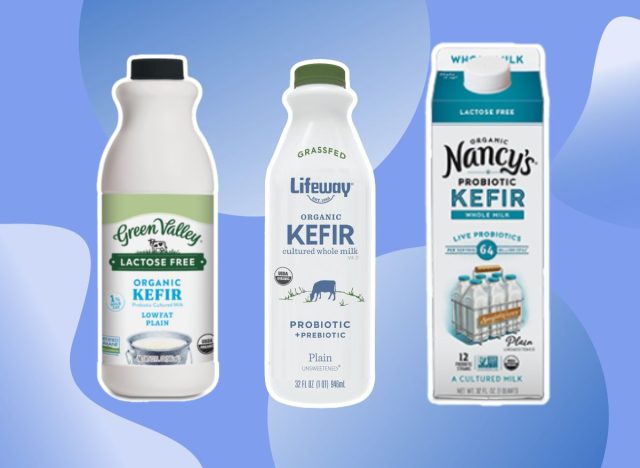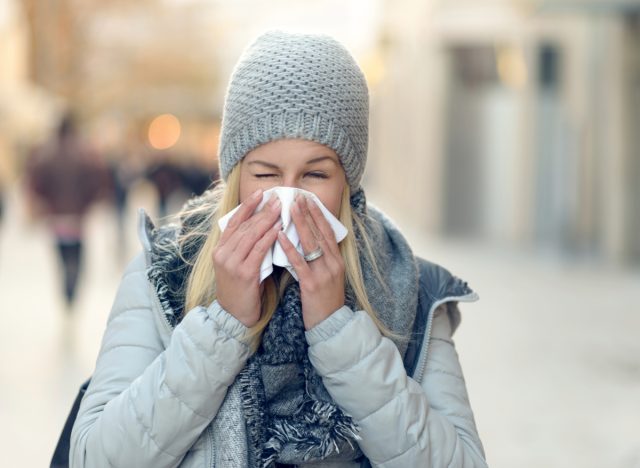11 Healthy Habits to Make Your Immune System Stronger

A perfect storm of airborne contagions is just about to pounce on our immune systems. For the first time in modern history, the Northern Hemisphere may experience a double whammy of serious illnesses as the seasonal influenza epidemic descends upon a country still in the throes of a pandemic. We know the nation isn’t ready, which is why experts are concerned that the convergence of seasonal flu and COVID-19 infections may overwhelm the health care system but are you ready?
“This is a critical year for us to try to take the flu as much off the table as we can,” Robert R. Redfield, MD, director of the Centers for Disease Control and Prevention (CDC) told viewers during a JAMA Network interview.
There are many simple things you can do to mount a formidable defense against both COVID-19 and the 2020 respiratory virus season, and we’re already doing some of them, such as wearing masks and social distancing. But there are also a few additional healthy habits that can help you double down on bolstering your immune system.
Now’s the time to put into practice these and other healthy habits that will boost the strength of your best defense, a strong immune system. And for a simple way to boost your immune system every day, why not start your day with one of the 27 Best Immune-Boosting Smoothie Recipes?
Spend time in the sunshine

Some scientists theorize that one reason we get more colds in the winter is that we get less exposure to the sun, and subsequently less vitamin D. The so-called “sunshine vitamin,” vitamin D is produced from the sun’s ultraviolet-B (UVB) rays. While vitamin D is believed to help facilitate normal immune system function, scientists need more research before declaring the vitamin D specifically protects against cold and flu. However, some studies suggest it may help. One randomized controlled trial followed 340 Japanese school kids for four months during flu season. Half of the participants received 1,200 IU of vitamin D supplements while the other half received placebo pills. Researchers found that flu rates in the vitamin D group were roughly 40% lower than in the placebo group. While you can get vitamin D from food, experts still recommend the best way to increase levels of the vitamin are by getting some rays or taking a supplement if you have a deficiency.
STAY INFORMED: Sign up for our newsletter to get the latest food news delivered straight to your inbox.
Take zinc supplements

While zinc is well known for its great antioxidant properties, research suggests that zinc supplements may boost your immune system strength. Studies show that zinc plays an important role in the production and proper functioning of all types of infection-fighting white blood cells like lymphocytes (b- and T-cells), neutrophils, and macrophages. In one double-blind study, 40 U.S. Air Force Academy cadets were given a 15-mg zinc supplement or a placebo daily. Following the 7-month experiment, researchers found that cadets taking the zinc reported significantly fewer symptoms of upper respiratory infections, according to the report published in the journal Complementary Therapies in Clinical Practice.
Sleep more than seven hours a night

Remember back when you pulled three all-nighters in a row studying for final exams? You caught a cold. It’s probably no coincidence. Studies show that lack of sleep may significantly lower immune system strength. Sleep researchers at the University of California – San Francisco, Carnegie Mellon University, and University of Pittsburgh Medical Center tested this theory by exposing 164 volunteers to the cold virus through nasal drops while monitoring their sleep and evaluating their health habits. It turned out that participants who slept less than five hours were four-and-a-half times more likely to catch a cold than those who regularly slept seven hours a night. “Not getting sleep fundamentally affects your physical health,” says Aric Prather, PhD, assistant professor of psychiatry at UCSF and author of the study. “Short sleep was more important than any other factor in predicting subjects’ likelihood of catching a cold.” To sleep better at night, Avoid These 17 Foods That Keep You Up at Night.
Drink water all day

And broth, and tea, and anything without a lot of sugar. “Being hydrated is important for immune health because water helps flush everything out,” says chef/dietitian Wesley McWhorter, DrPH, RD, a spokesperson for the Academy of Nutrition and Dietetics and an assistant professor at the University of Texas School of Public Health. “It’s critical for members of the aging population who tend to consume less liquid over the course of a day.”
Fill up on colorful produce

One of the best immunity-boosting habits to adopt is eating a healthy plant-based diet, says McWhorter. By varying your diet, you ensure you consume the most immune-boosting antioxidant vitamins like A, B6, C, E, plus selenium, iron, folic acid, and zinc. “Get a lot of fruits and vegetables in a range of colors,” McWhorter says. “One of the best is purple cabbage; it has one of the highest amounts of antioxidants, and it’s inexpensive. Eat more legumes for the fiber to improve your gut biome. Again, beans are inexpensive. Just rinse the excess sodium off of canned beans.”
Wash your hands often

It’s a good habit that many of us have adopted since Dr. Fauci started trumpeting coronavirus prevention. So, keep it up. Handwashing with soap and water for at least 20 seconds is the best way to kill germs. Second best: use hand sanitizer after touching things. We touch a lot of germy surfaces (one study found that people can touch their faces with their hands around 23 times per hour) and can easily transport viruses from inanimate objects inside our bodies by touching our eyes, mouth, and nose.
RELATED: 20 Facts That Will Change the Way You Wash Your Hands
Consume probiotic foods

Kefir, a fermented milk drink, and yogurt are loaded with probiotics, which are known to reduce the body’s inflammatory response. One study found that the good gut bacteria found in probiotic foods shortened the duration of colds by 2 days and reduced the severity of symptoms by 34%. If dairy products aren’t your thing, add some of the other probiotic foods to your diet.
Get a flu shot

Studies have shown that flu vaccination not only may protect you from getting the seasonal flu but will reduce the severity of the symptoms if you still get sick. For example, during 2018-2019 flu season, vaccination prevented an estimated 58,000 flu-related hospitalizations, according to the CDC. A 2018 study showed that from 2012 to 2015, flu vaccination among adults reduced the risk of being admitted to an intensive care unit (ICU) with flu by 82%. A flu shot triggers your immune system to produce antibodies against a specific strain of flu. It typically takes 2 weeks to build up your immunity to a flu virus after being vaccinated, and protection lasts for a few months before petering out. When is the best time be vaccinated? “October when Halloween candy hits the stores—that’s a good time to get the flu vaccine,” says Daniel Solomon, MD, of the Division of Infectious Diseases at Brigham and Women’s Hospital of the Harvard Medical School in Boston.
Exercise regularly

As long as you aren’t exerting your body so much that you become extremely exhausted, getting aerobic exercise regularly is good for your heart, lungs, brain, and immune system. In general, a healthier body is better prepared to fend off disease and infection, particularly upper respiratory infections like colds and the flu. In one study published in the British Medical Journal, researchers followed 1000 men and women for 12 weeks during the fall and winter seasons while monitoring them for symptoms and severity of upper respiratory tract infections (URTIs). Those subjects who reported doing aerobic activity five or more days per week experienced 43% fewer days suffering from URTIs than subjects who reported being largely sedentary.
Play with your pets

Rush-hour traffic, a tyrant boss, and loss of a job are all examples of psychological stress that can trigger the production of the stress hormone cortisol. Chronic accumulation of cortisol causes the immune system to become “resistant,” allowing increased production of inflammatory cytokines that further compromise the immune system (and can cause weight gain). To tamp down dangerous stress, pet your dog or cat. A study at Washington State University found that simply cuddling with your dog or cat for 10 minutes had a significant impact on reducing your cortisol levels.
Get your hands dirty

Plant a garden without wearing gloves. In other words, get your fingers dirty in the dirt. You may recall the “hygiene hypothesis” developed in the 1980s and ’90s when researchers linked an increasingly sanitized modern world where exposure to environmental microbes is limited to the increase in allergies and other immune system disorders. That hypothesis has some evidence to back it up; human studies comparing farming communities that use hand tools to those that use modern, mechanized equipment showed that the farm families who literally got their hands into their work suffered from fewer allergies. How can you put this habit to work? Start an Indoor Herb Garden: Grow These 13 Beginner-Friendly Herbs.